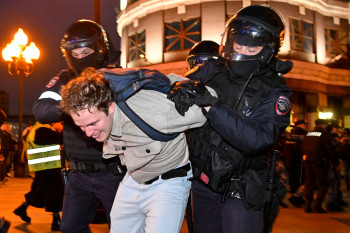Russian forces cling to west bank of Dnipro ‘against military logic,’ trapped by Kremlin’s annexation claims

Ukrainian forces are gaining ground in Kherson Oblast.
They are liberating villages and pushing towards the western bank of the Dnipro River, to squeeze the Russian forces against it. The Russian lines in the region are collapsing as their position west of the river gets less tenable by the day.
Months of HIMARS missiles taking out their command and control centers have left the Russians struggling to coordinate their units west of the Dnipro. The crippled bridges across the river make it very slow and difficult to resupply them.
Military analysts who spoke to the Kyiv Independent agreed that the most effective thing for Russia to do would be to move to the eastern side of the river and establish their defenses there.
“If they were smart, they’d pull back to the east bank of the Dnipro,” said Phillips O’Brien, a professor of strategic studies at St. Andrew’s University in the U.K. “They’re stuck on the west bank, they’re having real trouble getting supplies across. So they’re trying to maintain a modern army with very weak supply lines.”
“It’s a turkey shoot of the Russians,” he added.
Investigative project Conflict Intelligence Team (CIT) agrees with this assessment, saying Putin would be well advised to pull back to defend on the eastern bank of the Dnipro.
Serhii Kuzan, co-founder of the Ukrainian Security and Cooperation Center, told NV media outlet that Russians were clinging to the western bank "against military logic."
But the tragic irony for the Russian forces is that they can’t pull back. Only a week earlier, Russian President Vladimir Putin declared that the occupied parts of Ukraine will become Russian soil. Abandoning Kherson, the only regional capital Russia managed to occupy in seven months, would be humiliating.
Withdrawing from the city that the Kremlin has just proclaimed Russian would undermine the whole annexation effort, through which Russia sought to solidify its gains in Ukraine. As CIT has said, Russians have “painted themselves into a corner, literally.”
In fact, it was on Oct. 4, as the Russians were falling back in multiple regions of Ukraine, that the Russian parliament unanimously ratified the illegal annexation of four Ukrainian regions it doesn't control. Moscow is yet to formally draw its own borders.
"Down in the Kherson region where Ukraine is conducting their counter-offensive … the Russians essentially are in a defensive crouch. They are fighting, obviously. But they're in a defensive crouch, as opposed to further north up near Bakhmut (in Donetsk Oblast) where it's more offensive in nature," the U.S. Department of Defense said in a statement.
Trying to hold Kherson is a major drain on Russian resources and ties up some of its best troops at a time when they’re desperately needed elsewhere, according to the CIT. Earlier analyses showed that units west of the Dnipro included Russia’s elite airborne divisions and fresh soldiers from the Eastern Military district.
Their support could have been critical in Luhansk Oblast, where Ukrainian forces are also pushing the Russians back.
Eventually, Russian in Kherson will degrade so much that they will be forced to pull back across the river, whether under orders or otherwise, said O’Brien.
“The Ukrainians are trying to degrade Russian forces, that’s their number one goal,” he said. “The more they degrade, the more open areas they’re gonna find in other places. Ukrainians will probably be happy if the Russians stand and fight.”
The CIT agreed, saying the operation is now about breaking up the Russians’ coordination, making them unable to form a continued and effective defensive line in the gap between the Dnipro and the Inhulets Rivers. As long as the Russians can’t put a single line together, Ukrainians can keep advancing.
Ukrainian troops made good headway after breaking through the Russian lines around the start of October.
The Russian Defense Ministry’s maps appear to confirm a significant Oct. 4 retreat by Russian forces in a northeastern part of Kherson Oblast, an area of 30 kilometers.
Ukraine officially confirmed that eight villages were liberated on Oct. 4. These include the important village of Davydiv Brid on the Inhulets River. Russian military bloggers worried that a Ukrainian position east of the Inhulets will allow Ukrainian forces to drive the Russians towards the city of Kherson, according to the Institute for the Study of War.
Other liberated villages included Lyubimivka, Khreshchenivka, Zolota Balka, Bilyaivka, Ukrainka, Velyka Oleksandrivka and Mala Oleksandrivka.
According to President Volodymyr Zelensky, Ukrainian forces liberated dozens of villages across Ukraine so far this week.
____________________
Note from the author:
Hi, this is Igor Kossov, I hope you enjoyed reading my article.
I consider it a privilege to keep you informed about one of this century's greatest tragedies, Russia's ongoing invasion of Ukraine. With the help of my colleagues, I will continue to bring you in-depth insights into Ukraine's war effort, its international impacts, and the economic, social, and human cost of this war. But I cannot do it without your help. To support independent Ukrainian journalists, please consider becoming our patron. Thank you very much.











